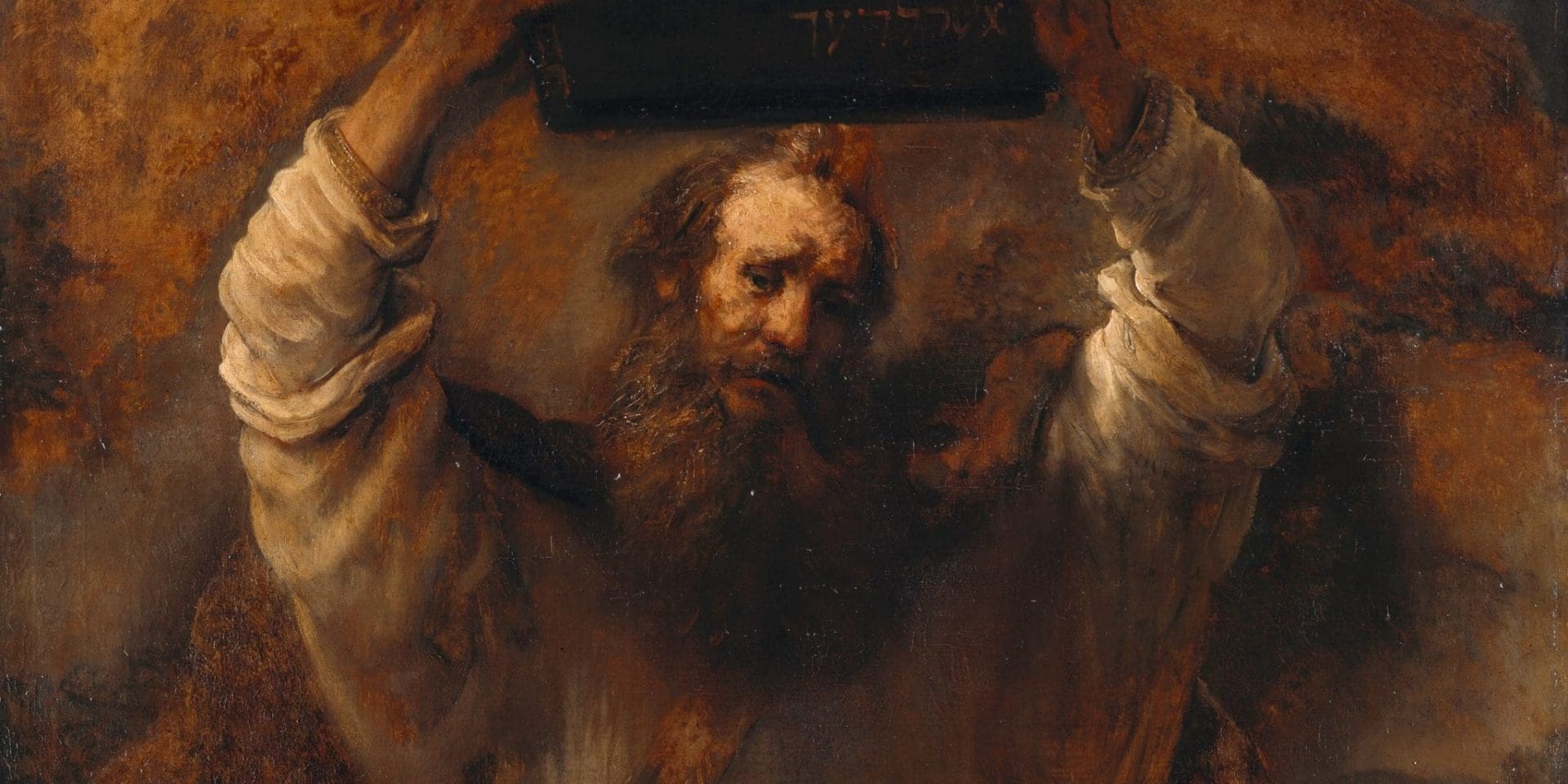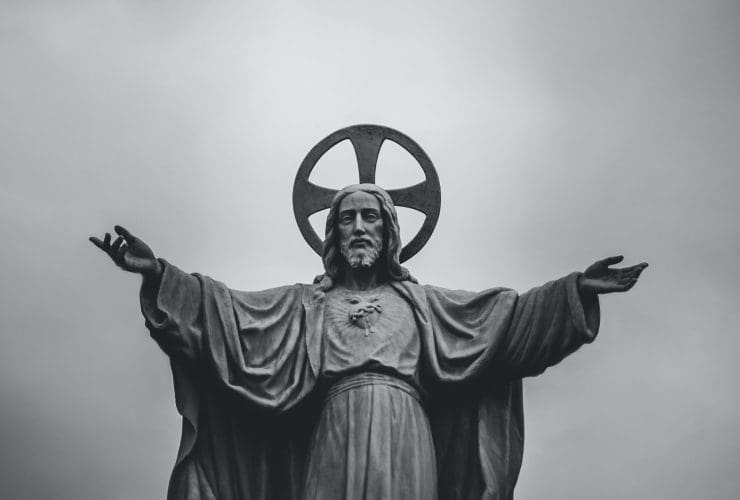Q:
“Most Christians believe we are saved by grace and not by law, but are upset when the Ten Commandments are removed from a public place. Scholars divide law into three categories of moral, cultural, or sacrificial. However Scripture does not place specific actions into a category. The Ten Commandments are regarded as moral law that we should follow, however most Christians worship on Sunday which is not the Sabbath. Jesus did explain that as well as some other laws. Does that mean the Sabbath law wasn’t a moral command? We are not saved by works but are saved to do good works. Question is: what works?”
Christopher Q.
This is a great albeit broad question! I think at the heart of it burns a real issue among Christians today: How much of the Old Testament Law should we keep? And do God’s moral laws still apply to us if Christians are “free” from the Law? This is especially pertinent in regard to the fourth commandment in particular to “Remember the Sabbath by keeping it holy” (Exodus 20:8), which is typically classified as part of God’s moral law and yet has seemingly looser moral consequences without observance. As usual, the devil is in the details.
First off, it would be folly to assume today’s slack moral standards are a reliable reference point of true Christian ethics. We, as a cultural whole, believe a lot of stuff that is just flat-out not Biblical, but is permitted to resonate, if you will, within the Church milieu, given God’s grace. And because of that fact, there will always be an abundance of overlap between any given culture and the Church as people transition over from a depraved lifestyle to a God-loving one. This is normal and to be expected; it does not happen overnight. Therefore, it would be profoundly unwise to determine the truth of something by its normalcy. In other words, something is true irrespective of popular or personal belief. With that in mind, it means we must plant our feet firmly on Scripture to come to a resolution, especially if we are to understand God’s moral law.
You are right to note that theologians typically divide the Law into three camps: ceremonial, civil and moral. Even though the Biblical authors do not use the same terminology we use today, theologians have not pulled these terms out of this air –– quite the opposite in fact –– it’s based on proper interpretation of the New Testament. And it’s to the latter that Christ emphasized. In Mark, Jesus said “The Sabbath was made for man, not man for the Sabbath.” (Mark 2:27) Here, Christ is explicitly emphasizing that there is a moral law that underpins and supports other law.
God’s Moral Law
Take for instance the teacher of the Law who asked Jesus “Of all the commandments, which is the most important?” In response, Jesus reduced every command down to the two greatest moral commandments in which all of “the Law and the Prophets hang” (Matthew 22:40): “The most important one,” answered Jesus, “is this: ‘Hear, O Israel: The Lord our God, the Lord is one. Love the Lord your God with all your heart and with all your soul and with all your mind and with all your strength.’ The second is this: ‘Love your neighbor as yourself.’ There is no commandment greater than these.” (Mark 12:29-31)
Notice that these two commands are not found in the Ten Commandments, rather it is the heart of the Shema Yisrael (Deuteronomy 6:5) and Leviticus 19:18. The reason being is that these two commands underpin every other commandment in the Law. An undeniable fact that even the teacher of the Law full-heartedly agreed with (Mark 12:32-33). This is the foundation of God’s moral law that’s based on His holy nature. It is universal, necessary and objective which, in turn, produces the fruit of the Spirit within true believers –– love, justice, mercy, joy, peace, longsuffering, forbearance, kindness, goodness, faithfulness, gentleness, self-control, and forgiveness –– against such things there is no law (Matthew 23:23; Galatians 5:22-23).
Furthermore, the effect of immorality and a lack of moral understanding is delineated throughout the Epistles such as in 1 Corinthians 6:9-11. God’s moral law is not gridlocked within the Ten Commandments alone, it goes beyond it. Jesus highlights this point several times over (Matthew 12:1-14; Mark 2:23-28; Mark 3:1-6), especially in relation to the Sabbath: “If any of you has a sheep and it falls into a pit on the Sabbath, will you not take hold of it and lift it out? How much more valuable is a person than a sheep! Therefore it is lawful to do good on the Sabbath.” But the significant detail here is that moral performance or how we behave outwardly is not the basis of effectual morality (check out Q1. What does the Bible say about Legalism?). So, if you keep the Sabbath, it does not justify you as a good person before God. Heartfelt love for God predicates a full keeping of the Law, and our works flow out from it (cf. Isaiah 11:13-17).
From Sabbath to the Lord’s Day
Even still, many works were permitted on “the seventh day of the week” such as priestly duties of offering sacrifices, preparing showbread, performing circumcision and teaching services, feasts of marriage and dedication, singing praises, gathering for worship, visiting a prophet or the Temple, preserving or protecting human/animal life and so on. Therefore, to equate “works” with physical action is inappropriate. Otherwise, if we take rest too literally, sleeping all day fulfills the call! But this was clearly not the point of Sabbath. In fact, the legalistic fervour for resting on the Sabbath seems to have spiked during the intertestamental period of the Maccabean Revolt (compare 1 Maccabees 2:32-41 to Joshua 6:15). The Sabbath is not about rest in itself, it’s about giving yourself to God so that you rest in Him (Hebrews 4:9-11), meaning in full that our default disposition ought to rest on God to live (Proverbs 3:5) since it is Him alone who gives the righteous rest (Exodus 33:14). These permitted actions on Sabbath all point to God, which was intended to help “make you holy”, and therefore does not exclude doing good deeds on Sabbath such as serving orphans and widows, helping the poor or hungry, or healing the sick and needy. If the Sabbath points to God, and God is the standard of goodness, then it follows that doing good things on the Sabbath is permitted because God is good and good things point to God (Matthew 5:16). As Christians, we are not bound by the strict regulations of Sabbath – but we keep the heart of it. A practice we have maintained for roughly two thousand years.
To reiterate above, going to Church on Sunday for early Christians did not replace going to the synagogue on Saturday in a legal sense. That means we are not required, under punishment of death or excommunication (Exodus 31:14), to rest on the Sabbath. Instead, it seems the Apostles gathered for worship and communion on “the first day of every week” (Acts 20:7; 1 Corinthians 16:2), which is Sunday, because of its historical and prophetic significance. Later down the line, it seems the Early Church continued to shift the customs of Sabbath such as teaching services, feasting, communion, singing praises, gathering for worship and remembering the Lord who freed us from bondage (being slaves of sin, as it were) from Saturday to Sunday. This is clearly a form of Sabbath, without the legal rigidness. Strikingly, the timing of Christ’s death and resurrection is also saturated with prophetic allusions.
Attested to throughout the Gospels is that Jesus rose from death on “the first day of the week” (Matthew 28:1; Mark 16:2; Luke 24:1; John 20:19), after the Sabbath day (Matthew 28:1; Mark 16:1). This highlights the prophetic earmark of that new creation motif layered throughout the Gospels. Christ was buried the day before Sabbath (Mark 15:42), rested on the Sabbath day, and then rose on the first day of ‘new creation’ as the light of the world (John 8:12; John 9:5; Matthew 5:14), like when God created light on the first day of creation. Also note, that God also separated the light from the darkness, too, which echoes symbolism of man’s depravity (John 3:19) and God’s judgment who “separates the sheep from the goats” (Matthew 25:32-33).
Furthermore, the word rest (or sleep) is often associated with a righteous person who dies will have rest in God (Isaiah 57:1-2; Matthew 11:28-30) whereas evil and wickedness is often associated with being “restless” (Genesis 4:12, 14; Matthew 12:43; James 3:8). If you map the meaning of rest over Exodus 31 where God says that the Sabbaths “will be a sign between me and you for the generations to come…. for in six days the Lord made the heavens and the earth, and on the seventh day he rested and was refreshed,’” (Exodus 31:13, 17) it engenders yet another prophetic double entendre for Christ as the signpost of rest to refresh your soul (Psalm 19:7, 23:3; Philemon 1:20). And if the purest form of rest can only come through God, as the spiritual affects the physical, then this only intensifies the deific claim of Jesus Christ: “Come to me, all who labor and are heavy laden, and I will give you rest. Take my yoke upon you, and learn from me, for I am gentle and lowly in heart, and you will find rest for your souls. For my yoke is easy, and my burden is light. At that time Jesus went through the grainfields on the Sabbath….” (Matthew 11:28-30; 12:1-8. Emphasis added).
Finding “rest” and being “refreshed” in Christ also has profound theological and eschatological symbolism when comparing the Israelite wilderness wandering, where only those who believed entered the Promised Land and given God’s rest, to new creation where God will ultimately give us rest (Acts 3:20-21; Psalm 95:7-11; Hebrews 3:7-11, 18-19; 4:1-11). Also take notice how in Exodus 31:13-17, specifically v.17, God the Father transitions from the first-person to looking at and speaking about “the Lord” in the third person, which might suggest, however subtle, that this prophetic sign was cloaked in messianic and trinitarian language.
The prophetic allusions and fulfillment of the Law by Jesus Christ warranted a shift from the Sabbath to the Lord’s Day because we went from dead to alive, from shadow to substance (Hebrews 10:1, Colossians 2:17), from law to Spirit (2 Corinthians 3:3-6). It is no coincidence, then, that each Gospel unequivocally states that Christ’s resurrection was “on the first day of the week” and that no Epistle or the book of Acts explicitly addresses this Sabbatical issue as a moral concern, rather it often addressed in passing as being fulfilled in God through new creation, suggesting the rules and rituals of Sabbath were grouped in with the rest of the ceremonial law as Jesus infers (John 7:21-24; Matthew 12:5; Mark 2:28) and as the prophet Hosea predicts (Hosea 2:11), all as a sign that points to the Messiah. Therefore, Christians are not held morally culpable for violating the Sabbath because we are a new creation in Christ (2 Corinthians 5:17).
Conclusion
So, should we observe the Sabbath as a moral command? –– No, not in the legal or ceremonial sense of it, but violating the heart of it can have moral consequences. In fact, the Apostle Paul even addresses this instance in passing in Colossians 2:16-17 and Romans 14:5-6. A few verses down, in Romans 14:13-14, he explicitly groups these dilemmas into a matter of conscience. Christ even said that the “Sabbath was made for man, not man for the Sabbath” (Mark 2:27-28) because man is made for God, and it is God “who makes you holy” (Exodus 31:13). Keep in mind; for the first few centuries, the Apostles had to deal with people from all walks of life, so there were many Christian slaves who did not have a choice but to work every single day, who were likewise transitioning over to a new way of life.
The real question we should be asking is if we should go to church on Sunday, the Lord’s Day? –– Yes! Not as a ritual for justification, but because you should desire to worship God with others who love and follow Jesus Christ (Hebrews 10:24-25). This fulfills the two greatest commandments in the purest sense of it –– love is what works! And by not desiring to remember what Christ did for us with fellow believers, it can lead to ineffectual moral standards or demonstrate a lack of desire to love fellow believers – a problem that John the Apostle spoke against in 1 John 2:9-11. Remember, moral law is grounded in the love of God and underpins our behaviour.
I apologize for the drawn-out response; your question was more complex than it gave off. I hope that helps address your difficulty. Thanks again, Christopher!

Matlock Bobechko is the Chief Operating/Creative Officer of Bible Discovery. He is an eclectic Christian thinker and writer, award-winning screenwriter and short filmmaker. He writes a blog on theology, apologetics, and philosophy called Meet Me at the Oak. He is also an Elder at his local church.






